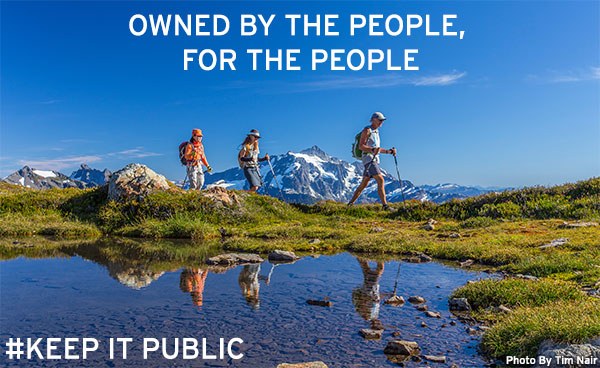
The 115th Congress spent the first day of its new session making it easier to sell off our public lands. On Tuesday evening, Congress passed a “rules package,” which contained a provision [Section 3(q)(1) of H.Res. 5 (p. 35)] allowing lawmakers to transfer federal lands to the state without accounting for the economic ramifications.
The provision bolsters a campaign to cede public lands to state control, where weaker protections will open the door to privatization. States manage public lands with different mandates than the federal government, and this makes it easier to sell our public lands off to developers – which means the end of access to, and protection of, these natural places.
For the past two years, The Mountaineers has worked hard to fight against the public land heist, and now we must stand together to protect these invaluable resources, explicitly created for the benefit of all Americans.
While the difference between land designations can be confusing, those who love wild places should take note: here in Washington, federal lands make up 28.5% of our state’s total acreage.
They include National Parks, National Forests, Wildlife Refuges, Wilderness Areas, and historic sites that protect our watersheds and natural resources. These are the places where we play: Rainier, St. Helens, Washington Pass, Hurricane Ridge, Ozette Triangle, Diablo Lake, Vantage, and Icicle Creek to name a few. And now they need our help.
The Cost of Public Lands
The provision passed by Congress would enable public land transfers to be treated as ‘budget neutral.’ Typically laws are scored to see how they would effect the federal budget and their cost to taxpayers. This new rule will automatically score all land transfer measures as budget neutral. This move is designed to make it look like giving away public land would cost nothing. In fact, public lands are a large source of government revenue, second only to taxes.
Our Lands Need Your Voice
To protect our public lands, everyone who loves the outdoors must pay attention and must share their voices, loudly, so that our elected officials know how important protecting the outdoor experience is to us. The Mountaineers partners with Outdoor Alliance to unite the voices of outdoor recreationists.
Together, we’re asking people across the nation to write their member of Congress. Tell him or her what public lands mean to you. The tool below makes it easy to send a message to your elected official.
Are we ready to do what it's going to take to defend the places where we play?
Thank you to everyone who has taken the time to let Congress know how important our Federal Public Lands are. New representatives were just sworn in a few days ago, and are just getting their offices set up.
For folks in Washington’s 7th District – Congresswoman Jayapal’s office is still working to set up their contact tools. We will work to get your letters sent her way.
Add a comment
Log in to add comments.I'd like to point out (since it was brought up in a previous posting) that the issue here is that the Feds generally manage public lands better than local governments. It's not a partisan issue or a Fed vs State one.
If public lands are ceded to state control, not only will there be WEAKER PROTECTIONS that will "open the door to privatization" but it will make it impossible for the public to follow what is happening or organize well to fight for these lands. This is a tactic used for all kinds of issues...sadly, I expect we will see a lot of this in the next four years...medical care,etc...
Many great examples of the importance of federal land versus state or local land can be seen in the Ken Burns documentary "The National Parks." It provides a great picture of how John Muir and other preservationists saw how states were poorly managing and commercializing precious lands that needed to be later turned over to the federal government for adequate protection. We are lucky to live in a region where our states would likely treat our lands with value, but this is not the case for much of the country, and we need to act in unity.
What is the best way to identify all my "lawmakers" and their direct contact information? The automated form linked to is fine but I suspect less impactful than an actual letter or email. Are the others outside congress would need to hear from us?
http://www.house.gov/representatives/find/
If your representative is Adam Smith, he is holding mobile office hours at the Beacon Hill library tomorrow.
Erik, good questions and a good point. Here's a site with a map of the state showing congressional districts, info about each congressperson and links to their websites: https://www.govtrack.us/congress/members/WA
 The Mountaineers
The Mountaineers